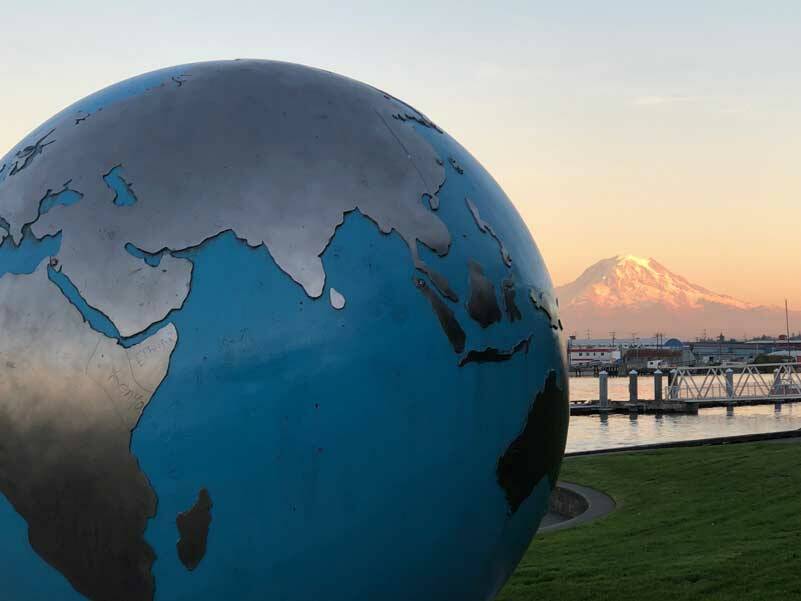Sixteen Washington-based businesses will receive business planning, networking, and pitch development support, along with technical training over the next few months as they prepare for NextCycle Washington’s inaugural cohort pitch competition in February 2023. Hosted by King County Solid Waste Division and the Washington departments of Commerce and Ecology, the competition will shine a light on environmental ventures that are primarily women and minority owned, and whose projects would expand the state’s circular economy.
The statewide cohort competition will put entrepreneurs focused on sustainability in front of potential investors who are interested in funding established business ideas through NextCycle Washington’s Circular Accelerator Tracks.
The 2022 program’s two tracks include “Upstream,” which is focused on preventing waste or improving reuse and repair of materials; and “Downstream,” which is focused on improving, innovating, or expanding recycling, organics recovery, and material end uses.
“We are excited about NextCycle Washington’s first cohort, representing women-led and minority organizations,” said Pat McLaughlin, King Could Solid Waste Division Director. “This is the intention of this state-wide initiative, to create a more equitable investment landscape for all Washingtonians.”
The NextCycle Washington teams that have been selected for the 2022-2023 cohort include the following:
Upstream
Community Gearbox, an app that facilitates the sharing, co-ownership, and mobilization of products that would otherwise be thrown away or left unused and prevents the purchase of new, community-redundant items
DeliverZero, a service that allows customers to utilize reusable containers when ordering through the delivery platforms
GeerGarage, an online company that facilitates the peer-to-peer rental of outdoor gear by matching renters with available products
Just Right Bite, creating an insect-based pet food that is circular in nature
Okapi Reusables, operating a reusable cup network at cafes and coffee shops
Plover, helping businesses create an upcycled product line within their brand by utilizing their unsellable inventory and pre-consumer materials
Refugee Artisan Initiative (RAI), expanding upcycling of materials, such as fire hoses, by refugee and immigrant women
South King Tool Library, expanding the “Tool Library in a Box” model in South King County.
Downstream
Birch Biosciences, Inc, developed a recycling approach for plastic using enzymes to depolymerize plastic, starting with non-bottle PET
Book Hill Group, Inc., designing products, such as garment bags and household accessories, for laundry, textiles, and wardrobes that will utilize recycled content
Duwamish Valley Sustainability Association, a South Park youth-led team developing an engineered solution using anaerobic digestion to generate low-carbon, sustainable fuel while building community capacity
Glacier, building AI-enabled robots that automate sorting, making recycling lower cost and more effective for recycling facilities of all sizes and budgets
Glass Packaging Institute, working to improve the feasibility and economics of recycling glass in underserved and more rural areas of Washington and is proposing a glass aggregation plant in Walla Walla
Ground2ground Glass, expanding efforts to process glass into a natural sand substitute in Walla Valley
Regenerated Textiles, local circular economy for textile waste – transforming landfill-bound clothing into new materials, minding global social and environmental impacts via shipping container sized recycling modules
Restaurant to Garden, a decentralized, hyperlocal system that composts local restaurant food waste into fertilizer and redistributes it to community gardens
*****
The teams were chosen from an application pool of 26 by the Track Governance Circle, a diverse group of external subject matter experts and people with lived experience from industry, local governments, and communities to provide oversight and guidance to the program. They were selected based on concept feasibility, value to Washington’s circular economy, project team qualifications, as well as environmental, social and economic impacts.
Over the next six months, the NextCycle Washington teams will work closely with experienced mentors, consultants, and subject matter experts to improve and refine business models and project plans. Programming will conclude with a pitch competition in which the teams will demonstrate their shovel ready projects to a live audience.
NextCycle Washington is currently accepting applications through November 16, 2022, for the Renew Seed Grants. Selected projects will receive up to $10,000 to develop early-stage projects focused on the reduction of waste or reuse, repair, or recycling of materials in Washington. The program plans to have a 2nd accelerator cohort in 2023.
NextCycle Washington is a state-wide initiative of King County Solid Waste Division, Washington departments of Commerce and Ecology, Seattle Public Utilities, and the Washington Recycling Development Center.
– WA Dept. of Ecology





